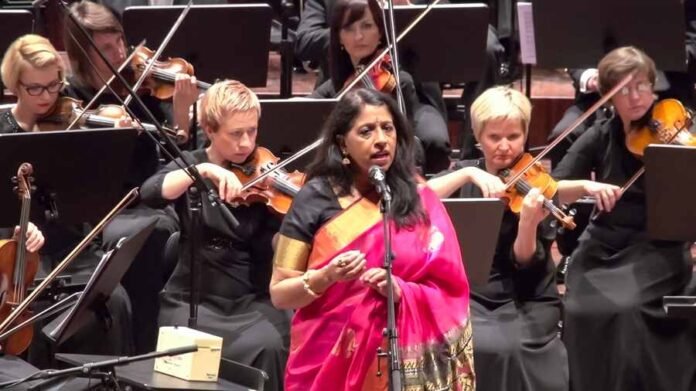The Lakshminarayana Global Music Festival presents its 33rd edition at the Sri Shanmukhananda Chandrasekarendra Saraswathi Auditorium on 13th January 2024 at 6.30 PM. There will be close to 100 musicians performing with Dr. L. Subramaniam, the featured soloist Kavita Krishnamurti Subramaniam and Ambi Subramaniam. Mahati Subramaniam will be performing Conversations with Dr. L. Subramaniam. The special guests for the evening will be the Symphonic Orchestra of Northern Kazakhstan, named after Akan Sery from Petropavlovsk, which will be conducted by Maestro Abzal Mukhitdin and Astana City Erkegali Rakhmadiyev State Academic Philharmonic Chamber Choir led by Ms. Gulmira Kuttybadamova from Kazakhstan. This festival is special because for the first time the maximum number of western symphony artists will be presented on one stage in Sri Shanmukhananda Chandrasekarendra Saraswathi Auditorium. The performance will include a traditional Kazakh instrument Dombyra played by Akshat Galeyev followed by a rendition of the Kazakhstan folk songs. The highlight of the concert will be Bharat Symphony, Paris Concerto & Conversations. This is also a celebration of Bharat for our 2024 new year.
The Bharat Symphony was specially written to celebrate India’s independence and it was commissioned by the mayor of Chicago in the World Music Festival at the Millennium Park, Chicago. It was written specifically for Kavita’s solo voice with the symphony orchestra and choir. This composition has been performed globally by Kavita with major symphony orchestras and also recorded with the London Symphony Orchestra in UK.
Bharat Symphony is a tapestry of Indian culture in four movements, representing the four major periods of Indian history in musical form:
The Vedic Period – The first movement incorporates melodic mantras from the six-thousand-year-old Rigveda Samhita, a sacred composition in the Sanskrit language, believed to be the world’s oldest treatise.
The Mughal Period – In the second movement, the Arabian influences that were prevalent after the 12th century was interwoven into the structure of the composition, by introducing Hindustani music and instruments like the tabla.
The British Period – The third movement focuses on the British period with interplay of various modes of orchestral music, with an emphasis on violin, which was introduced during the imperial British rule. The end of the third movement denotes the struggle for independence.
The Modern Period – The fourth movement starting with Satyameva Jayate (Truth alone triumphs) symbolizes the post-Independence period and traces global influences over the last seventy years and concludes with Bharat’s gift to the world, Vasudhaiva Kutumbakam (the whole world is one family) from the Chapter 6 of Maha Upanishad.
Paris concerto was commissioned and premiered by the Orchestra Chambre De Paris performed at the Philharmonie de Paris in 2016. Dr. L. Subramaniam and Ambi Subramaniam will be performing this concerto with the orchestra and the Indian ensemble whereas the other two compositions – Bharat Symphony and Astral Symphony will include the choir.
All the compositions are based on Raga Harmony, a concept created by Dr. L. Subramaniam to create complex, pleasing harmonies using traditional south Indian ragas (melodic concept) and incorporating poly rhythmic structure based on south Indian talas (rhythmic concept).
The concert in Mumbai is at the Sri Shanmukhananda Chandrasekarendra Saraswathi Auditorium on the 13th January at 6.30 PM.
On this occasion the Lakshminarayana International Award 2024 will be presented to the iconic composer Shri Pyarelal Sharma of the Laxmikant – Pyarelal.
The concert is free and open to all on a first cum first serve basis, except for the reserved seats.


